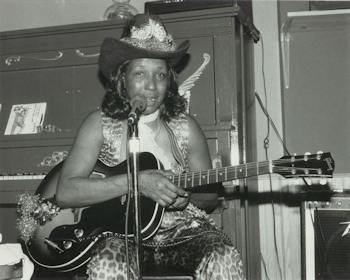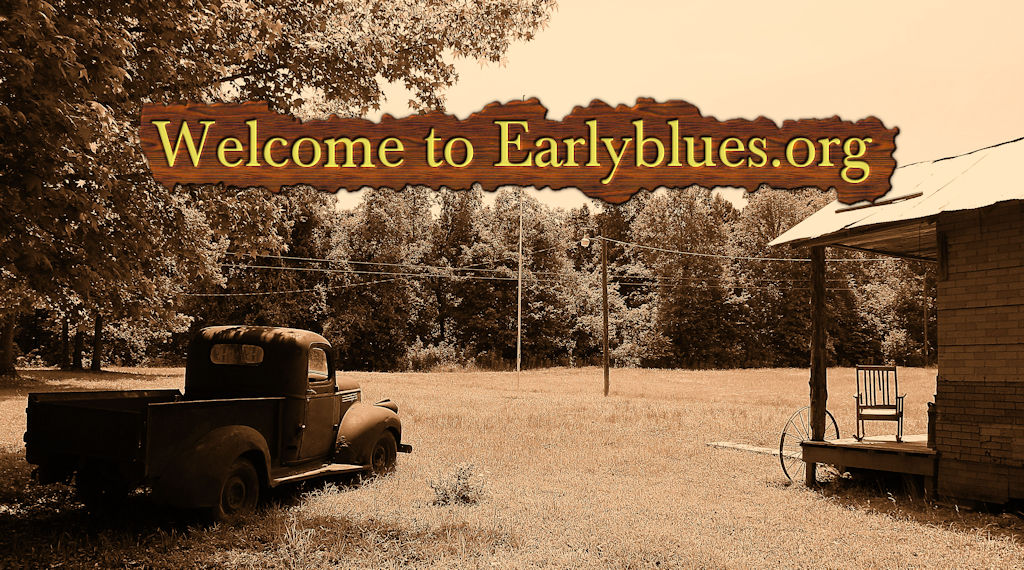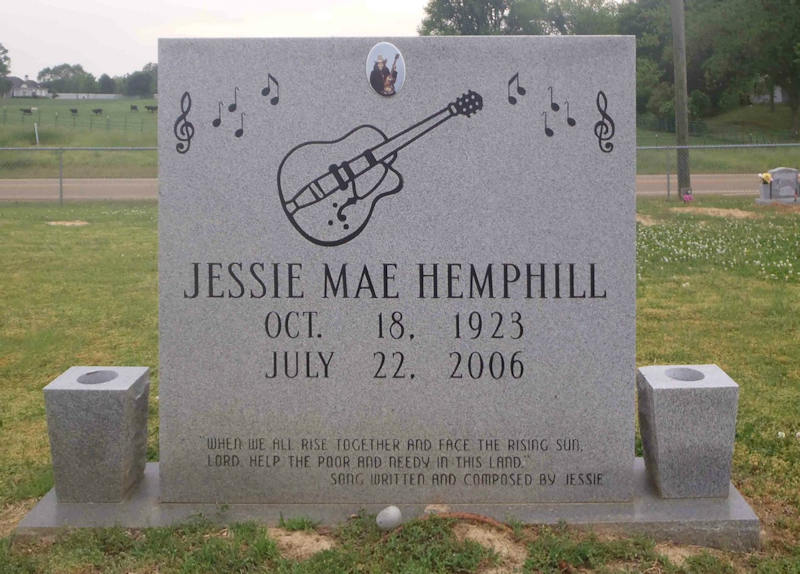‘Jessie Mae Hemphill Obituary’ – by Keith Woods, from Tales From The Woods
 Jessie Mae Hemphill, blues singer, songwriter, guitarist and drummer has died in a Memphis hospital on the 23rd of July 2006, following a perforated ulcer. Jessie Mae came from a distinguished Mississippi blues family. Her great-grandfather was a musician; her grandfather Sid Hemphill, who was blind, was a talented musician who could play guitar, banjo, fiddle, piano, quills and cane fife and other instruments. He played in the style that is unique to the northern counties of Mississippi around Como and Senatobia, in the tradition carried on by Othar Turner, and was first recorded in 1942 when he was in his sixties by blues researcher Alan Lomax.
Jessie Mae Hemphill, blues singer, songwriter, guitarist and drummer has died in a Memphis hospital on the 23rd of July 2006, following a perforated ulcer. Jessie Mae came from a distinguished Mississippi blues family. Her great-grandfather was a musician; her grandfather Sid Hemphill, who was blind, was a talented musician who could play guitar, banjo, fiddle, piano, quills and cane fife and other instruments. He played in the style that is unique to the northern counties of Mississippi around Como and Senatobia, in the tradition carried on by Othar Turner, and was first recorded in 1942 when he was in his sixties by blues researcher Alan Lomax.
Sid’s daughter Rosa Lee Hill was also recorded by Lomax, 20 years after her father, and her sisters Sidney Lee and Virgie Lee were also musical. Jessie Mae was Sidney Lee’s daughter, and inherited the family’s musical talent. It is known that her birthday was October 18th, but the year is uncertain, various sources place it between 1923 and 1937.
Like so many Mississippi musicians she learnt to play on a one-string diddley-bow, graduating to guitar at around age seven. She learnt to play bass drum and snare at an early age, and later played in her grandfather’s fife and drum band, which in the local tradition played at communal picnics. Her drumming skills outshone all others, male or female, in her community, and earned her the opportunity to tour with Napoleon Strickland’s fife and drum band.
In the fifties Jessie Mae moved to Memphis where she played in various bands in her spare time. In the early seventies she returned to Mississippi. The other family members were no longer musically active, so she decided to carry on the family musical tradition, encouraged by blues scholar and musician David Evans. By this time she had forsaken drums for guitar. Her style was typical of the region, using open tunings, and using the repetitive, hypnotic riffs associated with other artists from that area, from Fred McDowell to Junior Kimborough and R L Burnside. She managed to maintain contact with the oldest traditions of African-American music, while adding her own personal touch.
In 1980 Jessie Mae recorded the album “She-Wolf” for the French “Vogue” label, not released in the US. She toured Europe several times. In the US, she was gaining recognition. Jessie Mae was voted Best Traditional Female Blues Artist in the WC Handy awards in 1987 and 1988. Her first US release, “Feelin’ Good”, also won a Handy in 1991. There are a number of other recordings available on several compilation albums. In 1993 she suffered a stroke which left her partially paralysed, and she was confined to a wheelchair. She could no longer play guitar, and retired to a trailer in Senatobia. Despite her ill health, she recorded a double album of gospel standards, “Dare You To Do It Again”, in 2004, singing and playing a tambourine. “I’m singing for the Lord now”, she said. Jessie Mae Hemphill was an exceptional talent in her field.
Recommended listening: She Wolf (Hightone Records 1998)
Keith Woods
Wikipedia Entry:
Jessie Mae Hemphill (October 18, 1923 – July 22, 2006) was an American electric guitarist, songwriter, and vocalist specializing in the North Mississippi hill country blues traditions of her family and regional heritage.
Hemphill was born near Como and Senatobia, Mississippi, in the northern Mississippi hill country, just east of the Mississippi Delta. She began playing the guitar at the age of seven. She also played drums in local fife-and-drum bands, beginning with the band led by her paternal grandfather, Sid Hemphill, in which she played snare drum and bass drum. Aside from sitting in at Memphis bars a few times in the 1950s, most of her playing was done in family and informal settings, such as picnics with fife-and-drum music, until she was recorded in 1979.
Her first recordings were field recordings made by the blues researcher George Mitchell in 1967 and the ethnomusicologist David Evans in 1973, but they were not released. She was then known as Jessie Mae Brooks, using the surname from a brief early marriage. In 1978, Evans came to Memphis, Tennessee, to teach at Memphis State University (now the University of Memphis). The school founded the High Water Recording Company in 1979 to promote interest in the regional music of the South. Evans made the first high-quality field recordings of Hemphill in that year and soon after produced her first sessions for High Water.
Hemphill launched a recording career in the early 1980s. In 1981 her first full-length album, She-Wolf, was licensed from High Water and released by the French label Disques Vogue. In the early 1980s, she performed in a Mississippi drum corps assembled by Evans; it included Hemphill, Abe Young, and Jim Harper (who also played on Tav Falco’s Panther Burns’s album Behind the Magnolia Curtain). Hemphill performed in another drum group with Young and fife-and-drum band veteran Othar Turner for the television program Mr. Rogers’ Neighborhood. The French label Black & Blue Records released other recordings by her. Hemphill played concerts across the United States and in other countries, including France, Germany, Spain, Italy, Belgium, the Netherlands, Sweden, Switzerland, and Canada. In 1987 and 1988 she received the W. C. Handy Award for best traditional female blues artist. In 1987 she made her New York debut, accompanied by Evans and Walter Perkins. Her first American full-length album, Feelin’ Good, released in 1990, won a Handy Award for best acoustic album.
In 1993 Hemphill had a stroke, which paralyzed her left side, preventing her from playing guitar; she retired from her blues career. She continued to play by accompanying her band on the tambourine.
In 2004, the Jessie Mae Hemphill Foundation released Dare You to Do It Again, a double album and DVD of gospel standards, newly recorded by the ailing vocalist, singing and playing tambourine with accompaniment from Steve Gardner, DJ Logic, and descendants of the late musicians Junior Kimbrough, R. L. Burnside, and Otha Turner. They were her first recordings since her stroke in 1993. Also in 2004, Inside Sounds released Get Right Blues, containing material recorded from 1979 through the early 1980s, and Black & Blue released Mississippi Blues Festival, which includes seven live tracks by her from a Paris concert in 1986.
Hemphill died on July 22, 2006, at the Regional Medical Center in Memphis, after complications from an ulcer.


